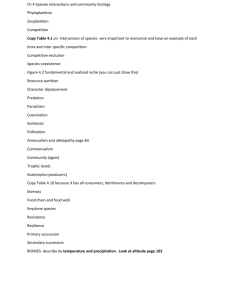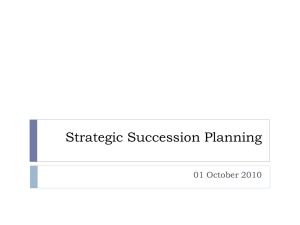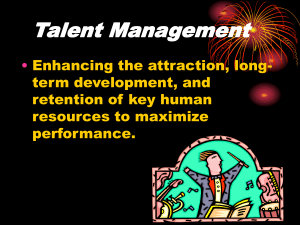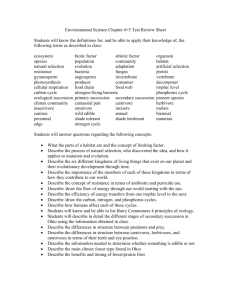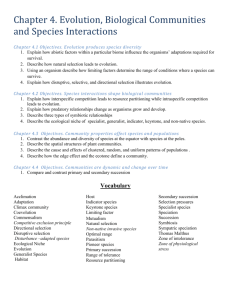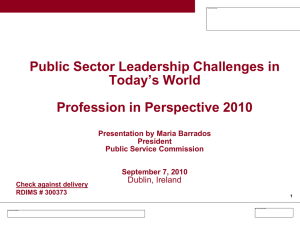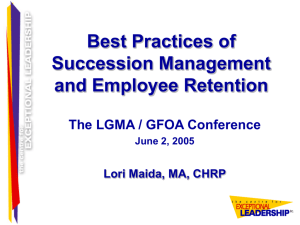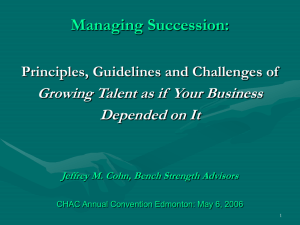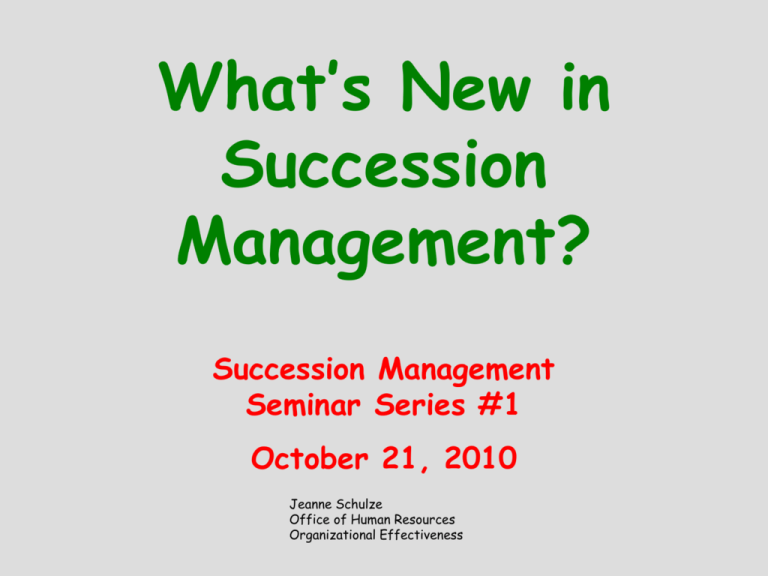
What’s New in
Succession
Management?
Succession Management
Seminar Series #1
October 21, 2010
Jeanne Schulze
Office of Human Resources
Organizational Effectiveness
What’s The Evidence?
Finding innovative solutions to many of the challenges
facing the United States and the world in the 21st
century will depend upon a creative, knowledgeable,
and highly skilled workforce. The application of
knowledge and skills to these challenges will help
maintain our country’s future economic prosperity and
growth, foster social well-being, and assure our
leadership position in the global economy.
Undergraduate education is important to the creation
of a stable economy because it provides students
with foundational knowledge and work skills and
prepares college graduates for a wide range of
employment options. But it is graduate education
that provides students with the advanced knowledge
and skills that will secure our future intellectual
leadership in the knowledge economy.
•Differences in the quality of
leadership explains as much as
45% of an organization’s
performance
How are
WE
doing?
Many
organizations
have serious
bench issues
Almost half of large
companies and
institutions have no
meaningful
management
succession plan
McKinsey War for Talent Study
• 3% We develop people effectively
• 10% We use job assignments as a key
developmental lever
• 16% We know who our high
performers are
• 23% We attract highly talented
people
• 30% We’re good at feedback and
coaching
• 75% We have insufficient talent or
are chronically short across the
board
The Current State….
• Organizations must go outside for talent
• Shortage of strong choices for top
leadership positions
• Too many top leaders who don’t succeed
• Still promoting people to their level of
incompetence
• Development plans, if they are created, are
not implemented.
• Our managers shy away from frank
discussions about needed improvements for
their direct reports.
•
“Succession Planning in Leading Companies” (Mahler Publishing, 1983) found in 1980’s
2002, Lominger Limited, All rights
reserved
Why Leaders Fail?
“More than any other way, they fail
by failing to put the right people in
the right job and the related
failure to fix people problems in
time”
Charan & Colvin, Fortune, June 2002
So, what’s new in
Succession Management?
• Not much!
The problem is not finding
something new…
• The problem is implementing what is
already well known.
We know…
• The pipeline for developing talent
• The strategic and operational design
issues to make succession work
• The intense issues, problems and
challenges confronting us
• We know we need to attract, retain
and develop talent
A LOOK AT THE BEST OF
THE BEST
Current and Future Practices
Five Forces Reshaping the Global Economy:
McKinsey 2010
1. Economic volatility is a permanent
feature (The new normal)
2. Globalization
3. Digitization is transforming the
informational revolution requiring new
ways of thinking
4. Increasingly global educational,
customer and labor markets:
students/workers/customers from
anywhere at anytime
5. Increasing needs for security, risk
management and global citizenship due
to geopolitical instability
In short, we must prepare
our future leaders for the
VUCA world ahead
In a VUCA world leaders need to be:
•
•
•
•
•
•
•
•
•
Agile learners
Strategic and tactical
Emotionally intelligent
Inspiring
Fast and careful decision makers
Builders of teams
Influential
New technical competencies
And, create environments that drive
performance and engagement
How does this future world
picture fit for us?
How does this future
leadership picture fit for us?
Small groups
5 minutes
Learnings from the Best
• Create better leaders: results, develop capabilities, a ready talent
pool
• Operate better in more complex environments
• Position themselves for the long term future
• Build cross-functional collaboration capability
• Treat talent management as a strategic asset (it takes an
organization to raise a leader)
• Believe that ignoring leadership development is done at your
own peril
• Manage & invest in development for a culture of leadership
• Address bigger and broader issues: social responsibility,
women in sr. positions, easier to work from home, appreciation
of global issues required for the job
Do leaders today
have “the right
stuff?”
© Copyright 2006 Robert W. Eichinger, All Rights Reserved
1. Intellectual Horsepower, 1st
Top
2. Functional Skills
13
3. Integrity/Trust
Rank
4. Ethics/Values
Ordered
Out of
5. Action Oriented
6. Perseverance
7. Customer Focus
67
8. Standing Alone
For
9. Drive for Results
Mgr’s &
Exec’s
10. Technical Learning
11. Managing Diversity
12. Boss Relationship
13. Comfort around VIPs
© Copyright 2002, Michael M. Lombardo & Robert W. Eichinger. All Rights Reserved
What don’t
leaders have
today that they
need to succeed
in the future?
© Copyright 2006 Robert W. Eichinger, All Rights Reserved
Bottom
13
Rank
Ordered
Out of
67
67.
66.
65.
64.
63.
62.
61.
60.
59.
58.
57.
56.
55.
Developing People, last
Personal Learning
Understanding Others
Dealing with Paradox
Confronting Direct Reports
Managing Vision/Purpose
Personal Disclosure
Managing Through Systems
Patience
Conflict Management
Directing Others
Motivating Others
Managing/Measuring Work
© Copyright 2002, Michael M. Lombardo & Robert W. Eichinger. All Rights Reserved
Five fatal flaws that lead to
failure as a leader?
1.Inability to Learn from Mistakes
2.Lack of Core Interpersonal Skills
3.Lack of Openness to New or
Different Ideas
4. Lack of Accountability
5. Lack of Initiative
Zenger and Folkman, The Extraordinary Leader, 2002
Why do
succession
efforts fail?
© Copyright 2006 Robert W. Eichinger, All Rights Reserved
They fail because…
1.Managers prefer to do the work
of individual contributors over
getting work done through others
2.Fear of having the difficult
conversations
3.Time
4.Not held accountable from the
top
5.Skill: Don’t know how
Something is seriously amiss in
the business of developing and
hiring the leaders of the future.
Too many top leaders fail in
office; too many succession
pipelines are bone dry.
If you start five years or even ten
years before the top leader is
going to retire, it may be too
late."
Ending the CEO Succession Crisis
Ram Charan
HBR, Feb 2005
Food for Thought
In small groups:
What resonates with you?
What doesn’t?
What’s New in
Succession
Management?
Succession Management
Seminar Series #1
October 21, 2010

